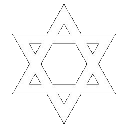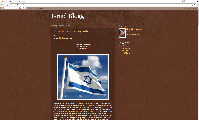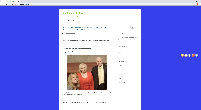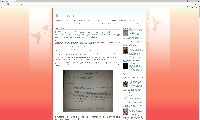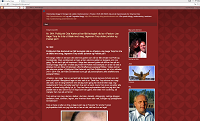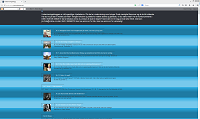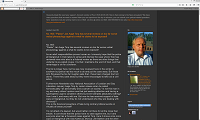Bibelkommentarer Obadjas bok
Veien igjennom bibelen - 2125-2135-Obadjas bok
Trykk her for å se bibel oversikt for Obadjas bok (bilde åpnes i nytt vindu)
Navnet Obadja betyr "Herrens tjener". Obadja er ganske spesiell dels ved at hans bok er den korteste blant de profetiske vitnesbyrd som er skrevet ned, og dels ved at han er den eldste av de profetene som har skrevet ned sitt budskap.
En mener at tiden for hans virksomhet var omkring år 880 f.Kr. At hans bok kommer som den fjerde i rekken av de små profetene motsier ikke dette. Rekkefølgen av de profetiske skriftene retter seg ikke etter tidspunktet de forskjellige opptrådte på. Ordningen av denne rekkefølgen har også blitt foretatt ut fra andre hensyn.
Det går fram av skriftet at Obadja var profet i Juda rike. Profetien i det retter seg særlig mot Edom, og grunnen for den er tydeligvis det fiendtlige angrepet som omtales i 2Krøn 21:16. Der blir kong Joram angrepet som straff for den ugudeligheten som han førte utover Juda og Jerusalem. Det var filisterne og araberne Herren brukte som redskaper for sin vrede.
Joram hadde på en spesiell måte levd et ugudelig liv. Da han besteg tronen hadde han myrdet sine seks brødre. Hans hustru var datter av Akab og Jesabel. Hun kan betegnes som et ondt menneske og dyrket avguder og fulgte stort sett i sin mors fortspor.
Herren lot en skrivelse fra profeten Elias komme til Joram med bud om den forestående dommen over han (2Krøn 21:12-15). Så kom dommen, og fiendene bortførte også alle kongens barn med untak av ett. Ved denne anledningen synes den handelen med israelitter å ha funnet sted som omtales hos Joel og Amos. De ble solgt til grekerne, og fønikere og edomitter hadde hjulpet til med denne handelen.
Edomittene hadde nemlig kort tid i forveien gjort opprør mot Juda og tatt seg sin egen konge (2Krøn 21:8). Nå benyttet de denne gode muligheten da filisterne og araberne hadde knust Juda, til å la det gamle hatet sitt få fritt spillerom.
De tok del i plyndringene, gledet seg over Judas ulykke og holdt drikkelag med fiendene på Sions berg. De fanget de jødene som forsøkte å flykte og utleverte dem til fiendene.
I denne trengselstiden må profeten Obadja ha opptrådt. Edom var på høyden av sin makt. Det var rikt og selvstendig. Juda var derimot ydmyket, knust og plaget. Men Herrens tanker med Juda var ikke å la det bli helt tilintetgjort. Derfor sendte han sin profet for at han kunne forkynne undergang for det overmodige Edom, men frelse og oppreisning for Juda som var ydmyket.
Selv om Obadjas bok bare utgjør ett kapitel, har hans ord likevel stor kraft. I så måte står han ikke tilbake for noen andre. Jødene sammenligner hans bok med et sennepskorn. Det er mindre enn andre frø, men likevel har det stor livskraft og har en skarpt smak som i høyeste grad gjør seg gjeldende på tross av at det er lite.
Språket hos Obadja er gammelt. Det er ikke blomstrende, men er fast og bestemt uten omsvøp. Idet han med ordets hammer slår løs på Edoms "høye bolig", viser han hvordan hovmot står for fall. Om Edom har opphøyet seg så høyt som ørnen flyr, skal det likevel styrtes ned i støvet.
Edoms djevelske plan om å tilintetgjøre løftets folk fullstendig, skulle mislykkes. Herrens løfter til sitt eiendomsfolk skulle oppfylles til tross for fiendskapet Edom hadde mot det.
Obad 1-16
Vi kan dele kapitelet i tre deler. Først blir dommen over Edom kunngjort i sterke ord, v. 1-9. Deretter blir Edoms synder beskrevet, v. 10-16 . Og endelig finner vi løfter til det nedtrykte "Jakobs hus" i v. 17-21.
I overskriften benevnes boken som profeten Obadjas "syn" (v. 1). Hver åpenbaring fra Gud er jo et åndelig syn, og her har vi et profetisk syn om noe som skal skje i framtida. Vil vi forstå Obadjas profeti imot Edom i dens fulle dybde, må vi ha klart for oss den stillingen Edom inntar i forhold til Guds rikes historie.
Riktignok er Edom her et forbilde på alle fiender av Guds rike, men at Edom her som så mange andre steder i Bibelen, blir nevnt som et bilde på den antikristelige verdensmakten, kommer nok av at Edoms hat ikke bare ligger på det nasjonale, men på det religiøse planet. Det er som Edom aldri har kunnet glemme det som hendte i gammel tid mellom stamfedrene Esau og Jakob. Esau ble som vi vet, svært sint over at han gikk glipp av velsignelsen som han likevel hadde foraktet. Uten å ville ha den samme tro som Jakob, ville han likevel ha del i velsignelsen. Spesielt ville han ha del i den timelige velsignelsen.
Det er et typisk uttrykk for det verdslige sinnet også i våre dager. En vil ikke omvende seg og leve et hellig liv i tro, men likevel vil en ikke unne andre den herligheten som følger med en sann og ekte omvendelse.
Dette Kains-sinnet fantes hos Edom i forhold til "Jakobs hus" som en trist arv etter stamfaren. Vi møter dette hatet hos edomitten Doeg på Davids tid (se 1Sam 22 og Sal 52). Vi møter det også hos Herodes den store, edomitter på den tiden da Kristus ble født.
Profeten begynner med å kunngjøre krig mot Edom. Det var noe han hadde hørt fra Herren (v. 1). Han ser allerede at Edom vil bli gjort "liten" og "dypt foraktet" "blant hedningefolkene" (v. 2).
Edomittene stolte på at landet deres var nesten utilgjengelig for andre enn dem selv på grunn av mange "fjellkløfter" og høye boliger i fjellene (v. 3).
Edoms land var vanskeligst å innta fra vestsiden. Landet består av mektige klipper med mange kløfter med både naturlige og kunstige huler. Derfor ble også de eldste innbyggerne kalt horitter som betyr huleboere. Av v. 3 ser vi at også en del av edomittene bodde i huler.
Hovedstaden var Sela (også kalt Petra, begge ordene betyr klippe henholdsvis på hebraisk og gresk), og det finnes utallige minnesmerker og ruiner som vitner om den. Byen lå i en deilig, frodig dal med mange kilder, men beliggenheten var slik at den var tilgjengelig bare gjennom smale fjellpass.
Alt dette stolte Edom på slik profeten uttaler det her: "Du som sier i ditt hjerte: Hvem vil styrte meg ned til jorden?" Men han sier også: "Ditt hjertes overmot har bedratt deg."
Og han kunngjør Herrens ord for Edom at selv om det ville fly så høyt som ørnen og bygge sitt "rede" høyt oppe "blant stjernene", så skulle det likevel bli styrtet ned derfra (v. 4).
Nattens "tyver" og røvere pleide enda å være fornøyd med å stjele bare det de trengte. Og de som høstet inn vindruene, lot det alltid være "en etterhøst tilbake" (v. 5).
Men "Esau" (slik blir Edom kalt etter sin stamfar) skulle bli så grundig "ransaket" at ikke noe av "hans skjulte skatter" skulle unngå fiendenes øye og hånd (v. 6).
Edom skulle få erfare at de folkeslagene de hadde gjort seg til venns med gjennom det felles hatet til Juda, ville bedra det. De ville følge Edom "like til grensen". Dette betyr sannsynligvis at de ville kaste Edom ut av dets eget land slik man leder en som er landsforvist til landets grenser slik at han fortest mulig kan forsvinne.
Edoms tilsynelatende gode venner skulle vise seg å være falske venner, som også ville undertrykke Edom. På den måten skulle Edom komme til å spise sitt daglige brød med bitter smerte lik den som har en smertefull verkebyll.
Edoms tro på egen klokskap, noe som hadde ført til at det hadde gått i forbund med Judas fiender, skulle vise seg å være total dumhet. "Det er ingen forstand hos ham!" sies det (v. 7).
Kilde : Gullgruben. C.Asschenfeldt-Hansen bibelkommentarer
INTRODUCTION
This is the shortest book in the Old Testament. The name means "servant of Jehovah." Obadiah stands fourth among the minor prophets according to the Hebrew arrangement of the canon, the fifth according to the Greek. Some consider him to be the same as the Obadiah who superintended the restoration of the temple under Josiah, 627 B.C. (2Ch 34:12). But Ob 11-16, 20 imply that Jerusalem was by this time overthrown by the Chaldeans, and that he refers to the cruelty of Edom towards the Jews on that occasion, which is referred to also in La 4:21, 22; Eze 25:12-14; 35:1-15; Ps 137:7. From comparing Ob 5 with Jer 49:9, Ob 6 with Jer 49:10, Ob 8 with Jer 49:7, it appears that Jeremiah embodied in his prophecies part of Obadiah's, as he had done in the case of other prophets also (compare Isa 15:1-16:14 with Jer 48:1-47). The reason for the present position of Obadiah before other of the minor prophets anterior in date is: Amos at the close of his prophecies foretells the subjugation of Edom hereafter by the Jews; the arranger of the minor prophets in one volume, therefore, placed Obadiah next, as being a fuller statement, and, as it were, a commentary on the foregoing briefer prophecy of Amos as to Edom [Maurer]. (Compare Am 1:11). The date of Obadiah's prophecies was probably immediately after the taking of Jerusalem by Nebuchadnezzar, 588 B.C. Five years afterwards (583 B.C.) Edom was conquered by Nebuchadnezzar. Jeremiah must have incorporated part of Obadiah's prophecies with his own immediately after they were uttered, thus stamping his canonicity.
Jerome makes him contemporary with Hosea, Joel, and Amos. It is an argument in favor of this view that Jeremiah would be more likely to insert in his prophecies a portion from a preceding prophet than from a contemporary. If so, the allusion in Ob 11-14 will be to one of the former captures of Jerusalem: by the Egyptians under Rehoboam (1Ki 14:25, 26; 2Ch 12:2, &c.), or that by the Philistines and Arabians in the reign of Joram (2Ch 21:16, 17); or that by Joash, king of Israel, in the reign of Amaziah (2Ch 25:22, 23); or that in the reign of Jehoiakim (2Ki 24:1, &c.); or that in the reign of Jehoiachin (2Ki 24:8-16). On all occasions the Idumeans were hostile to the Jews; and the terms in which that enmity is characterized are not stronger in Obadiah than in Joe 3:19 (compare Ob 10); Am 1:11, 12. The probable capture of Jerusalem alluded to by Obadiah is that by Joash and the Israelites in the reign of Amaziah. For as, a little before, in the reign of the same Amaziah, the Jews had treated harshly the Edomites after conquering them in battle (2Ch 25:11-23), it is probable that the Edomites, in revenge, joined the Israelites in the attack on Jerusalem [Jaeger].
This book may be divided into two parts: (1) Ob 1-6 set forth Edom's violence toward his brother Israel in the day of the latter's distress, and his coming destruction with the rest of the foes of Judah; (2) Ob 17-21, the coming re-establishment of the Jews in their own possessions, to which shall be added those of the neighboring peoples, and especially those of Edom.
CHAPTER 1
Ob 1-21. Doom of Edom for Cruelty to Judah, Edom's Brother; Restoration of the Jews.
1. Obadiah—that is, servant of Jehovah; same as Abdeel and Arabic Abd-allah.
We—I and my people.
heard—(Isa 21:10).
and an ambassador is sent—Yea, an ambassador is already sent, namely, an angel, to stir up the Assyrians (and afterwards the Chaldeans) against Edom. The result of the ambassador's message on the heathen is, they simultaneously exclaim, "Arise ye, and let us (with united strength) rise," &c. Jer 49:14 quotes this.
2. I have made thee small—Thy reduction to insignificance is as sure as if it were already accomplished; therefore the past tense is used [Maurer]. Edom then extended from Dedan of Arabia to Bozrah in the north (Jer 49:8, 13). Calvin explains it, "Whereas thou wast made by Me an insignificant people, why art thou so proud" (Ob 3)? But if so, why should the heathen peoples be needed to subdue one so insignificant? Jer 49:15, confirms Maurer's view.
3. clefts of … rock—(So 2:14; Jer 48:28). The cities of Edom, and among them Petra (Hebrew, sela, meaning "rock," 2Ki 14:7, Margin), the capital, in the Wady Musa, consisted of houses mostly cut in the rocks.
4. exalt thyself—or supply from the second clause, "thy nest" [Maurer] (Compare Job 20:6; Jer 49:16; Am 9:2).
set … nest among … stars—namely, on the loftiest hills which seem to reach the very stars. Edom is a type of Antichrist (Isa 14:13; Da 8:10; 11:37).
thence will I bring thee down—in spite of thy boast (Ob 3), "Who shall bring me down?"
5. The spoliation which thou shalt suffer shall not be such as that which thieves cause, bad as that is, for these when they have seized enough, or all they can get in a hurry, leave the rest—nor such as grape-gatherers cause in a vineyard, for they, when they have gathered most of the grapes, leave gleanings behind—but it shall be utter, so as to leave thee nothing. The exclamation, "How art thou cut off!" bursting in amidst the words of the image, marks strongly excited feeling. The contrast between Edom where no gleanings shall be left, and Israel where at the worst a gleaning is left (Isa 17:6; 24:13), is striking.
6. How are the things of Esau searched out!—by hostile soldiers seeking booty. Compare with Ob 5, 6 here, Jer 49:9, 10.
hidden things—or "places." Edom abounded in such hiding-places, as caves, clefts in the rock, &c. None of these would be left unexplored by the foe.
7. Men of thy confederacy—that is, thy confederates.
brought thee … to the border—that is, when Idumean ambassadors shall go to confederate states seeking aid, these latter shall conduct them with due ceremony to their border, giving them empty compliments, but not the aid required [Drusius]. This view agrees with the context, which speaks of false friends deceiving Edom: that is, failing to give help in need (compare Job 6:14, 15). Calvin translates, "have driven," that is, shall drive thee; shall help to drive thee to thy border on thy way into captivity in foreign lands.
the men that were at peace with thee—literally, "the men of thy peace." Compare Ps 41:9; Jer 38:22, Margin, where also the same formula occurs, "prevailed against thee."
they that eat thy bread—the poorer tribes of the desert who subsisted on the bounty of Edom. Compare again Ps 41:9, which seems to have been before Obadiah's mind, as his words were before Jeremiah's.
have laid a wound under thee—"laid" implies that their intimacy was used as a SNARE laid with a view to wound; also, these guest friends of Edom, instead of the cushions ordinarily laid under guests at table, laid snares to wound, that is, had a secret understanding with Edom's foe for that purpose. Maurer translates, "a snare." But English Version agrees with the Hebrew, which means, literally, "a bandage for a wound."
none understanding—none of the wisdom for which Edom was famed (see Ob 8) to extricate him from his perilous position.
in him—instead of "in thee." The change implies the alienation of God from Edom: Edom has so estranged himself from God, that He speaks now of him, not to him.
8. (Isa 49:7; compare Job 5:12, 13; Isa 19:3; Jer 19:7).
in that day … even destroy—Heretofore Edom, through its intercourse with Babylon and Egypt, and from its means of information through the many caravans passing to and fro between Europe and India, has been famed for knowledge; but in that day at last ("even") I will destroy its wise men.
mount of Esau—that is, Idumea, which was a mountainous region.
9. cut off by slaughter—Maurer translates, "on account of the slaughter," namely, that inflicted on Judea by Edom (compare Ob 14). The Septuagint, Syriac, and Vulgate connect these words with Ob 10, "for the slaughter, for the violence (of which thou art guilty) against thy brother Jacob." English Version, "cut off by slaughter" (that is, an utter cutting off), answers well to "cut off for ever" (Ob 10). However, the arrangement of the Septuagint gives a better parallelism in Ob 10. "For the slaughter" (1) being balanced in just retribution by "thou shalt be cut off for ever" (4); as "For thy violence (not so bad as slaughter) against thy brother Jacob" (2) is balanced by "shame (not so bad as being cut off) shall cover thee" (3). Shame and extinction shall repay violence and slaughter (Mt 26:52; Re 13:10). Compare as to Edom's violence, Ps 137:7; Eze 25:12; Am 1:11.
10. against thy brother—This aggravates the sin of Esau, that it was against him who was his brother by birth and by circumcision. The posterity of Esau followed in the steps of their father's hatred to Jacob by violence against Jacob's seed (Ge 27:41).
Jacob—not merely his own brother, but his twin brother; hence the name Jacob, not Israel, is here put emphatically. Compare De 23:7 for the opposite feeling which Jacob's seed was commanded to entertain towards Edom's.
shame … cover thee—(Ps 35:26; 69:7).
for ever—(Isa 34:10; Eze 35:9; Mal 1:4). Idumea, as a nation, should be "cut off for ever," though the land should be again inhabited.
11. thou stoodest on the other side—in an attitude of hostility, rather than the sympathy which became a brother, feasting thine eyes (see Ob 12) with the misery of Jacob, and eagerly watching for his destruction. So Messiah, the antitype to Jerusalem, abandoned by His kinsmen (Ps 38:11).
strangers—the Philistines, Arabians in the reign of Jehoram, &c. (2Ch 21:16); the Syrians in the reign of Joash of Judah (2Ch 24:24); the Chaldeans (2Ch 36:1-23).
carried … captive his forces—his "host" (Ob 20): the multitude of Jerusalem's inhabitants.
cast lots upon Jerusalem—(Joe 3:3). So Messiah, Jerusalem's antitype, had lots cast for His only earthly possessions (Ps 22:18).
12. looked on—with malignant pleasure, and a brutal stare. So the antitypes, Messiah's foes (Ps 22:17). Maurer translates, as the Margin, "thou shouldest not look" any more. English Version agrees with the context better.
the day of thy brother—his day of calamity.
became a stranger—that is, was banished as an alien from his own land. God sends heavy calamities on those who rejoice in the calamities of their enemies (Pr 17:5; 24:17, 18). Contrast the opposite conduct of David and of the divine Son of David in a like case (Ps 35:13-15).
spoken proudly—literally, "made great the mouth"; proudly insulting the fallen (Eze 35:13, Margin; compare 1Sa 2:8; Re 13:6).
13. substance—translated "forces" in Ob 11.
14. stood in the crossway, to cut off those of his—Judah's.
that did escape—The Jews naturally fled by the crossways. (Maurer translates, "narrow mountain passes") well known to them, to escape to the desert, and through Edom to Egypt; but the Edomites stood ready to intercept the fugitives and either kill or "deliver them up" to the foe.
15. For—resumptive in connection with Ob 10, wherein Edom was threatened with cutting off for ever.
the day of the Lord—the day in which He will manifest Himself as the Righteous Punisher of the ungodly peoples (Joe 3:14). The "all" shows that the fulfilment is not exhausted in the punishment inflicted on the surrounding nations by the instrumentality of Nebuchadnezzar; but, as in Joe 3:14, and Zec 12:3, that the last judgment to come on the nations confederate against Jerusalem is referred to.
as thou hast done, it shall be done unto thee—the righteous principle of retribution in kind (Le 24:17; Mt 7:2; compare Jud 1:6, 7; 8:19; Es 7:10).
thy reward—the reward of thy deed (compare Isa 3:9-11).
16. ye … upon my holy mountain—a periphrasis for, "ye Jews" [Maurer], whom Obadiah now by a sudden apostrophe addresses. The clause, "upon My holy mountain," expresses the reason of the vengeance to be taken on Judah's foes; namely, that Jerusalem is God's holy mountain, the seat of His temple, and Judah His covenant-people. Jer 49:12, which is copied from Obadiah, establishes this view (compare 1Pe 4:17).
as ye have drunk, &c.—namely, the cup of wrath, being dispossessed of your goods and places as a nation, by Edom and all the heathen; so shall all the heathen (Edom included) drink the same cup (Ps 60:3; Isa 51:17, 22; Jer 13:12, 13; 25:15-33; 49:12; 51:7; La 4:21, 22 Na 3:11; Hab 2:16).
continually—whereas Judah's calamity shall be temporary (Ob 17). The foes of Judah shall never regain their former position (Ob 18, 19).
swallow down—so as not to leave anything in the cup of calamity; not merely "drink" (Ps 75:8).
be as though they had not been—not a trace left of their national existence (Job 10:19; Ps 37:36; Eze 26:21).
17. upon … Zion … deliverance—both in the literal sense and spiritual sense (Joe 2:32; Isa 46:13; 59:20; Ro 11:26). Maurer as the Margin explains it, "there shall be a remnant that shall escape." Compare Isa 37:32; to the deliverance from Sennacherib there described Grotius thinks Obadiah here refers. "Jerusalem shall not be taken, and many of the neighboring peoples also shall find deliverance there." Unlike Judah's heathen foes of whom no remnant shall escape (Ob 9, 16), a remnant of Jews shall escape when the rest of the nation has perished, and shall regain their ancient "possessions."
there shall be holiness—that is, Zion shall be sacrosanct or inviolable: no more violated by foreign invaders (Isa 42:1; Joe 3:17).
18. fire—See the same figure, Nu 21:28; Isa 5:24; 10:17.
house of Jacob … Joseph—that is, the two kingdoms, Judah and Ephraim or Israel [Jerome]. The two shall form one kingdom, their former feuds being laid aside (Isa 11:12, 13; 37:22-28; Jer 3:18; Ho 1:11). The Jews returned with some of the Israelites from Babylon; and, under John Hyrcanus, so subdued and, compelling them to be circumcised, incorporated the Idumeans with themselves that they formed part of the nation [Josephus, Antiquities, 13.17; 12.11]. This was but an earnest of the future union of Israel and Judah in the possession of the enlarged land as one kingdom (Eze 37:16, &c.).
stubble—(Mal 4:1).
19. they of the south—The Jews who in the coming time are to occupy the south of Judea shall possess, in addition to their own territory, the adjoining mountainous region of Edom.
they of the plain—The Jews who shall occupy the low country along the Mediterranean, south and southwest of Palestine, shall possess, in addition to their own territory, the land of "the Philistines," which runs as a long strip between the hills and the sea.
and they shall possess the fields of Ephraim—that is, the rightful owners shall be restored, the Ephraimites to the fields of Ephraim.
Benjamin shall possess Gilead—that is, the region east of Jordan, occupied formerly by Reuben, Gad, and half Manasseh. Benjamin shall possess besides its own territory the adjoining territory eastward, while the two and a half tribes shall in the redistribution occupy the adjoining territory of Moab and Ammon.
20. the captivity of this host—that is, the captives of this multitude of Israelites.
shall possess that of the Canaanites—Maurer translates, "the captives … whom the Canaanites (carried away captive into Phœnicia) even unto Zarephath, shall possess the south," namely, Idumea as well as the south (Ob 19). Henderson, similarly, "the captives that are among the Canaanites," &c. But the corresponding clauses of the parallelism are better balanced in English Version, "the ten tribes of Israel shall possess the territory of the Canaanites," namely, Western Palestine and Phœnicia (Jud 3:3). "And the captives of Jerusalem (and Judah) shall possess the southern cities," namely, Edom, &c. Each has the region respectively adjoining assigned to it; Israel has the western Canaanite region; Judah, the southern.
even unto Zarephath—near Zidon; called Sarepta in Lu 4:26. The name implies it was a place for smelting metals. From this quarter came the "woman of Canaan" (Mt 15:21, 22). Captives of the Jews had been carried into the coasts of Palestine or Canaan, about Tyre and Zidon (Joe 3:3, 4; Am 1:9). The Jews when restored shall possess the territory of their ancient oppressors.
in Sepharad—that is, the Bosphorus [Jerome, from his Hebrew Instructor]. Sephar, according to others (Ge 10:30). Palæography confirms Jerome. In the cuneiform inscription containing a list of the tribes of Persia [Niebuhr, Tab. 31.1], before Ionia and Greece, and after Cappadocia, comes the name CPaRaD. It was therefore a district of Western Asia Minor, about Lydia, and near the Bosphorus. It is made an appellative by Maurer. "The Jerusalem captives of the dispersion" (compare Jas 1:1), wherever they be dispersed, shall return and possess the southern cities. Sepharad, though literally the district near the Bosphorus, represents the Jews' far and wide dispersion. Jerome says the name in Assyrian means a boundary, that is, "the Jews scattered in all boundaries and regions."
21. saviours—There will be in the kingdom yet to come no king, but a prince; the sabbatic period of the judges will return (compare the phrase so frequent in Judges, only once found in the times of the kings, 2Ch 14:1, "the land had rest"), when there was no visible king, but God reigned in the theocracy. Israelites, not strangers, shall dispense justice to a God-fearing people (Isa 1:26; Eze 45:1-25). The judges were not such a burden to the people as the kings proved afterwards (1Sa 8:11-20). In their time the people more readily repented than under the kings (compare 2Ch 15:17), [Roos]. Judges were from time to time raised up as saviours or deliverers of Israel from the enemy. These, and the similar deliverers in the long subsequent age of Antiochus, the Maccabees, who conquered the Idumeans (as here foretold, compare 2 Maccabees 10:15,23), were types of the peaceful period yet to come to Israel.
to judge … Esau—to punish (so "judge," 1Sa 3:13) … Edom (compare Ob 1-9, 15-19). Edom is the type of Israel's and God's last foes (Isa 63:1-4).
kingdom shall be the Lord's—under Messiah (Da 2:44; 7:14, 27; Zec 14:9; Lu 1:33; Re 11:15; 19:6). |


